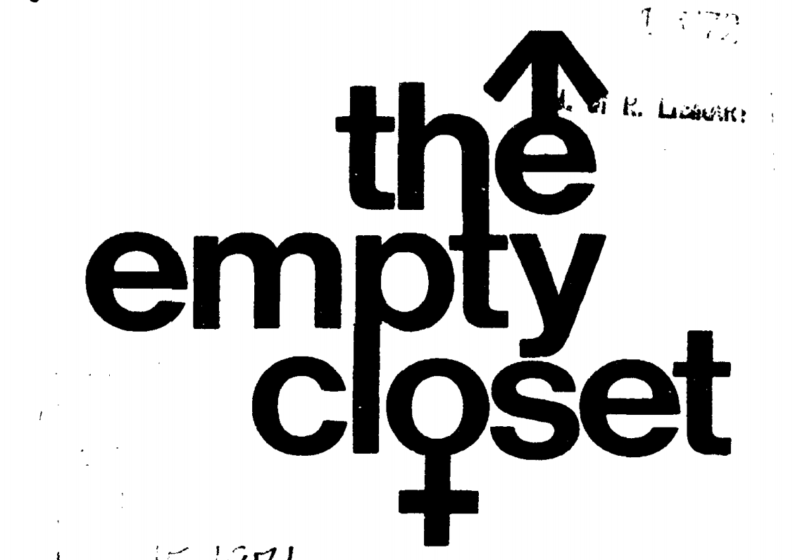Not many end their first year of college by confronting their identity and hitchhiking cross-country.
Fewer return to start a local liberation movement. But Larry Fine did just that.
In 1968, Fine had excelled academically and musically in high school. But his first year at UR did not go well.
“It was tough, in part, because I wasn’t doing well in physics. But it was also tough because I was very lonely,” Fine admitted in a 2013 interview. Fine, though he knew he liked men, didn’t know the word “gay,” or that a gay community existed.
In a 1971 essay published by the Empty Closet, an LGBTQ+ newspaper Fine helped start, he wrote, “The loneliness, the frustration of being unable to share my thoughts completely with someone, was extremely painful. How I managed to endure ten years of it is beyond me.
That all changed in the beginning of his sophomore year when he met Jay Efran, his psychology professor. Efran was conducting an experiment about counseling, and he needed test subjects. Fine volunteered.
In these counseling sessions, Fine came to terms with his loneliness and then his sexuality. The experiment ended, but Efran and Fine kept meeting.
“I finally got the courage to tell him that I thought I was a homosexual,” Fine recalled. “He had me repeat it several times to get used to saying it. And then he told me that it was okay, and that blew my mind.”
Through Efran, Fine met another gay student, a senior named Jeff.
Jeff told Fine about the gay community, San Francisco, and the nationwide movement in its infant stages. Fine resolved to go to San Francisco, come back to UR in the fall of 1970, and start Rochester’s own gay liberation group.
“On the last day of Passover, I met, for the first time, a person who was openly gay,” Fine wrote in his essay. “As the sun set on that Jewish holiday of freedom, I set down a ten-year burden and was set free.”
Fine took out a Campus Times ad by dropping through the office door an envelope with fifty cents and a message: “Take heart, brothers, gay lib is coming.
That August, he hitchhiked to San Francisco, even once sleeping by the side of a highway. He stayed a couple weeks experiencing the gay liberation subculture there before heading back.
The journey took its toll and he became sick, unable to start his group. But Bob Osborn, a graduate student in astrophysics, had the same idea, and it was Osborn that organized that first meeting of the Gay Liberation Front on October 3, 1970.
Within a couple months, Osborn, Fine, and some other students set up an office in Todd Union, got SA recognition, hosted dances, began a speakers bureau where members would speak to classes and local organizations, and held regular meetings, often about topics like homosexuality and the law.
They also created the Empty Closet, now one of the longest running LGBTQ+ newspapers in the country.
With typewriters, a hand stapler, and a mimeograph machine, the Empty Closet was compiled, assembled, and distributed nearly every month. The newsletter consisted of news bulletins, literary essays, poetry, and coming-out stories.
In Fine’s words, “It wasn’t one group that just did legislative work, and one group that did social work, et cetera. One group had to do everything. And so the organization did a little of everything. And the Empty Closet had a little of everything in it.”
Fine never graduated from UR. He dropped out of college in April 1971 and lived all over the country. The impetus was his “realization that I was getting so much more of an education out of my [Gay Liberation Front] work than of my coursework,” Fine said. “I was taking courses in psychology and sociology, where gays were seen as being deviants and all that.”
He went to trade school, did years of work in AIDS, started his own publishing company, and tuned pianos. For roughly the past 40 years, Fine has been a piano technician, publishing “The Piano Book,” a detailed guide to pianos.
Fine’s Empty Closet essay “Feeling Gay” — about his personal journey from coming out to his parents to gay liberation — is part of his UR legacy.
Twenty years after “Feeling Gay” was first published, Fine reconnected with some UR students. “I thought they wouldn’t even remember me — much to my surprise I was a hero to them,” Fine said. “The article I had written and other things I had done made a profound effect on them, and it helped them come out a few years later.”
Fine did not revolutionize the gay movement; his mark on the world was that he simply lived as himself. As he wrote in “Feeling Gay”: “So, you see, we are real people, with real human feelings (even some schmaltz). Surprise!”
He added, “We are capable of loving in the deepest sense members of our own sex, and our love is beautiful.”





